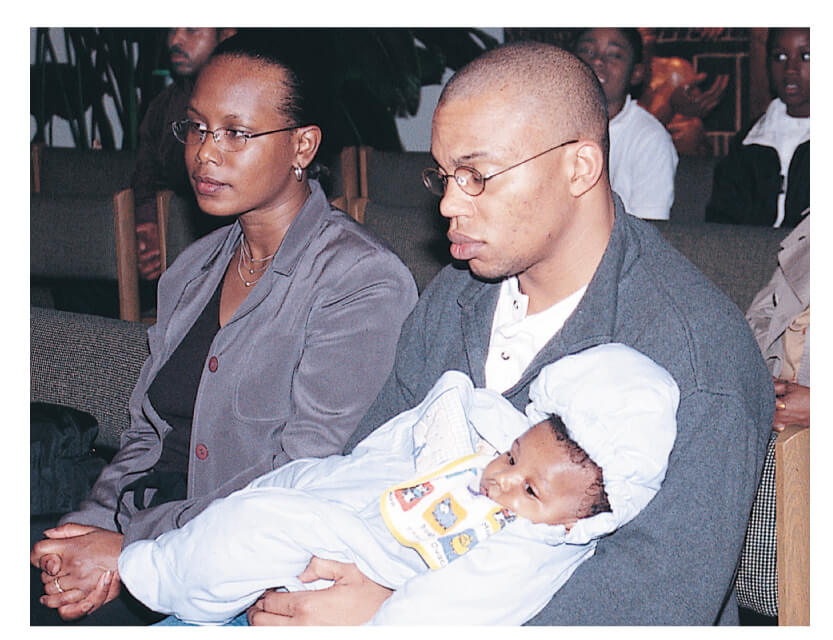Prophets interpret events in history from God’s point of view. In his prophecies Isaiah promises God will one day send Israel a leader who will be God-with-us – Emmanuel. This leader will embody and make God present with us. This leader will build a kindom of shalom, the Jewish word for peace, among us.
Emmanuel will stand in contrast to Israel’s leaders in Isaiah’s time. The prophet is fed up with kings who take from the poor and lead the country into war. This is what Israel’s young 20-year-old King Ahaz is about to do in 735 B.C.
In Sunday’s first reading Isaiah tries to convince King Ahaz that peace is possible if he simply trusts in God. Just as we can sometimes find it difficult to convince ourselves and others that peace is possible in our world, Isaiah meets similar skepticism in Ahaz.
Neighboring kings want to take advantage of Ahaz’s inexperience. Pekah, king of Israel’s northern kingdom, and Rezin, king of neighboring Syria, are pressuring Ahaz to join in going to battle against superpower of their time—Assyria. Ahaz is running scared. The king and his court tremble with fear like leaves in the wind, Isaiah reports.
God sends Isaiah to meet the young king and tell him he doesn’t need to fear. “Ask a sign of the Holy One, your God,” Isaiah says to Ahaz. “Let it be deep as the nether world or high as heaven.”
Ahaz refuses. “I will not ask,” he says. “I will not put God to the test.”
The king’s answer exasperates Isaiah. He asks sarcastically, “Is it too little for you to make mortals weary? Must you weary my God, too?” Isaiah gives Ahaz the sign he won’t ask for. The sign is a child.
A young woman is with child and shall bear a son, and shall name him Emmanuel.
Isaiah 7.14
In this prophecy Isaiah is not so much foretelling the future as expressing his faith that God will be faithful to Israel and someday send a just king. At the time Isaiah’s words to Ahaz may have meant, “You’ll lose your throne. Right now a young woman is conceiving a child who will replace you as king, a real leader who listens to God and brings God’s ways among us.”
Isaiah also prophesies to Ahaz that before the child Emmanuel gets old enough to refuse evil and choose the good, the lands of the two kings whom Ahaz fears will be desert. But Ahaz cannot trust this promise. He can’t see trusting God as a viable foreign policy, so he voluntarily asks to become a vassal state of Assyria and sends gold and silver from the temple treasury to the Assyrian leader Tiglath-pileser.
Ahaz collaborates with the enemy and installs an Assyrian-style altar in the temple where Isaiah serves as a priest. Isaiah prophesies that Ahaz’s faithlessness will bring destruction and defeat on his family.

Matthew wants us who hear the story of Jesus’ birth to recognize God’s faithfulness. Christians see in Jesus the child Isaiah promised centuries earlier. Jesus is Emmanuel.
In his ministry Jesus challenges us to lose our Ahaz attitudes and be less skeptical that peace and justice are possible. Jesus is God with us. He reveals in his every word and action what God is like. He shows us in human form that God heals the sick, forgives the sinner, blesses the least, works for justice and the liberation of the oppressed. He is the leader whose every action broadcasts ways to build in our world a community of shalom, a kindom that is whole and holy.
In Jesus, God is with us as one of us, as one who can touch and put his arms around us. From having God with us in Jesus, we Christians learn the infinite value of the love our hands, hearts, and minds can express.
Jesus shows us we can be like God by acting as he acted. Jesus helps us to see the possibility of peace and justice in this world, and our ability to work for these goals.
To act on our compassion for people in need and our passion for justice continues Jesus’ mission of bringing peace on earth to all. Christmas is our feast because Jesus’ incarnation continues in us.
For by his incarnation the Son of God has united himself in some fashion with every human. He worked with human hands, he thought with a human mind, he acted by human choice, and loved with a human heart. Born of the virgin Mary, he has truly been made one of us, like us in all things except sin.
Catechism of the Catholic Church, #521, 525
Dreaming Peace, Praying for Peace
What dream for the world would you like to participate in making come true? In Advent SPIRIT has explored visions of peace—Frodo’s journey to destroy the ring; different ways teens work for social justice; our human capacity to draw others into our lives in friendship. Dreaming the wholeness and peace we want for ourselves and our world is part of developing a moral vision, a God’s eye view of our potential for good and our freedom to love.
Dream is a word for positive aspirations, ideals, and goals but also for illusions and impossible fantasies. Draw or doodle to help bring to the surface a vision that expresses your deepest desires for our world, your deepest desires for yourself, for those you most care about, and for those most in need of your care.
- Make a commitment to try one way to build peace and bring about positive change that you have learned about this Advent, whether through nonviolent communication, nonviolent action, community organizing, or creating art.
- Read Being Peace by Thich Nhat Hanh to learn even more ways to develop and spread peace in your daily life.
